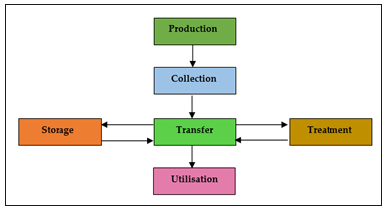Organic Farming: An Agricultural Waste Management System for Enhancing Soil Properties and Crop Yield by Oreva Oghene Aliku* in Modern Concepts & Developments in Agronomy_ International Journal of Agronomy

Abstract
Sustainable
agricultural production systems are crucial for meeting the food demand of the
ever-increasing human population. However, these systems generate large amount
of wastes which is a major environmental challenge when not properly managed.
The difficulty and cost-related constraints associated with achieving
sustainable food production through effective soil and crop management
practices has led to a paradigm shift from inorganic farming to organic
farming, where agricultural wastes are incorporated into the production
systems. Organic farming applies natural principles for improved quality and
quantity of crop produce while maintaining and/or improving soil health. This
paper explores some ways in which agricultural wastes are used and their
impacts on soil properties and crop yield in organic farming systems.
Introduction
Agriculture
is very pivotal to human growth and development. This is due to the production
of food and fiber which are needed by humans all over the world. However,
agriculture is also associated with the production of large amount of wastes
such as crop residues, animal manure, etc. [1]. These wastes are usually
difficult to dispose and often reduces environmental aesthetics and quality as
they are usually disposed on open fields or burnt in most parts of the world.
Those left on the field encounter wetting and dry processes which may sometimes
cause anaerobic conditions that lead to bad smell, attraction of flies and
insects, and spread of epidemic diseases, while those burnt are usually
associated with air pollution and release of obnoxious and greenhouse gases
[2]. Aiyelari EA [3] explained that burning of agricultural wastes could be
detrimental to human health and the environment owing to the release of
greenhouse gases to the atmosphere which could also lead to global warming
effects. Some consequences of this phenomenon may result into chaotic weather
changes, food insecurity, starvation and malnutrition [4]. In recent years,
agricultural production has advanced beyond the focus on great yield production
to improved food quality, human nutrition and environmental quality via practices
that improve environmental health, sound ecology, while enhancing food
security. Rodale [5] advised that instead of focusing on greater yields in
production agriculture, which will eventually exhaust soil nutrients, the goal
should be an agricultural management system that has the capability to preserve
or improve soil quality and the environment. Lokeshwari M [2] noted that most
agricultural wastes contain biodegradable hemicellulose and cellulose
materials, which on decomposition improve soil properties and supply nutrients
to crops
https://crimsonpublishers.com/mcda/fulltext/MCDA.000599.php
Crimson
Publishers: https://crimsonpublishers.com/
For more articles in International Journal of Agronomy,
Please click on below link: https://crimsonpublishers.com/mcda/


No comments:
Post a Comment